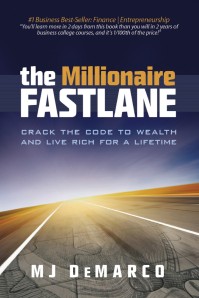
In a previous post – The Practical Applications Of Fear In A Modern World – I discuss how unnecessary fear can seep into our consciousness and derail our ambitions.
I have decided to write a follow-up piece on risk, since the two elements go hand-in-hand.
However, instead of me discussing risk and risk tolerance as it relates to business and entrepreneurship, I thought it would be better to have a renowned businessperson and self-made millionaire provide you with his unique perspective on the topic. I was fortunate enough to have MJ DeMarco—author of the bestselling business book The Millionaire Fastlane—share his wisdom.
 In your book, The Millionaire Fastlane, you talk about the Fastlane and the Sidewalk as two opposing roadmaps to wealth. Can you define these terms?
In your book, The Millionaire Fastlane, you talk about the Fastlane and the Sidewalk as two opposing roadmaps to wealth. Can you define these terms?
A Sidewalker is someone who has no financial plan, and their decision making is governed mostly by instant gratification and ego. They’re always financially redlining—one adversity away from being bankrupt, homeless, or back living in their parent’s basement.
A Fastlaner has a clear financial plan predicated on Fastlane Entrepreneurship—a controlled method of business ownership that focuses on explosive income and asset values via leveraged business systems. They seek to create clearly defined value with the intent to deliver it to the masses in scale or magnitude. The result is extraordinary wealth created extraordinarily fast.
Most people are on the Sidewalk—they work for someone else, make bad financial decisions, and never reach financial freedom. However, as you know, there’s an adverse relationship between risk and reward—the higher the risk, the greater the reward. So although the Fastlane sounds appealing, isn’t it ultimately too risky for most people?
Taking the sidewalk toward financial freedom is equivalent to peddling a tricycle from New York to Las Vegas—it would be painfully slow and terribly inefficient. Yet, many people find it acceptable means of transportation.
The problem with the tricycle plan is that is it entirely uncontrollable. You cannot control the job market, the stock market, or the housing market, and if you can’t control the lynchpins to your finances, you don’t control your financial plan.
Just look around at your peers, co-workers, and parents—people can’t find work. MBAs and college grads are waiting tables and bartending at Applebees. Retirees are going back to work while others are pushing off retirement until 70. Clearly, the plan they trusted isn’t working: the tricycle plan is the risk!
If you want to control your financial plan and mitigate risk, you need to dump the old hardline apparatuses’ of income and wealth, and move to a plan that can be both CONTROLLED AND LEVERAGED.
And yet, entrepreneurs are told that starting a business is the big risk?
Any successful entrepreneur found a way to create value in a controllable environment. The stock market, the job market, and the housing market had no part of that equation. Once I ditched the tricycle and took the driver seat of my financial life, everything changed.
For people with low tolerance to risk, are they destined to remain on the Sidewalk?
Not at all. Exiting the Sidewalk has nothing to do with risk; it’s about discipline. The ability to leave the sidewalk is available to anyone, regardless of career or income. It’s about taking personal responsibility for your actions and becoming mindful of the consequences of those actions. That shift in thinking is risk free, and reaps ‘happiness’ dividends far in the future due to the avoidance of unfavorable circumstances. Think about it this way; most people desire to be happy. Well, having poor money management is like gambling at the casino—the house always wins! And when the house wins, you’re not going to be happy.
Traveling in the Fastlane requires a certain mindset that is deeply embedded in a person’s psychology. What are some ways a person on the Sidewalk can retrain their brain to think like a millionaire?
If you are unhappy with your money situation, stop looking at money and start looking at value. The key element in money transfer is VALUE—if you create, innovate, or add VALUE, money will transfer from one party to another. The greater the value, in terms of utility and scale, the greater the money flow.
VALUE is to MONEY as WATER is to LIFE.
People like Bill Gates, Steve Jobs, Lady Gaga, or Mark Zuckerberg have created and given our society a tremendous amount of value and have been duly compensated for it.
Some people may take on unnecessary risk with the hopes of getting lucky because they think that is how successful people became rich. How much of a role does luck play in the lives of successful people?
Luck definitely plays a role; however it is often misunderstood and anchored by false beliefs.
As a Fastlane Entrepreneur, you need to look at luck through the paradigm of probabilities. If you’re sitting on your butt all day watching Dr. Phil and Judge Judy, can you reasonably expect to get lucky?
Conversely, the entrepreneur who has learned to fail, test, and tease the market with his executed ideas will ultimately be the one who gets lucky. Why? Because those who act are the ones who bend probability in their favor.
When it comes to luck in business, there is no better analogy than the lottery. If ‘winning’ represents financial freedom, then your ‘entry’ into the game would be ‘action’. The more actions you initiate into the game, the higher your probability of winning.
What are the Worst Case Consequence Analysis and Weighted Average Decision Matrix, and how can they be used to identify, assess, and mitigate risk?
Worst Case Consequence Analysis (WCCA) is a simple decision making process where you carefully make decisions by assessing the probability of a worst case outcome. If you can avoid these outcomes and the decisions that put those probabilities into your life, I guarantee you’ll be a much happier person with far better circumstances.
In general, we want to stick to decisions that have UNLIMITED UPSIDE with LIMITED DOWNSIDE. The example I use in my book, The Millionaire Fastlane (theMillionaireFastlane.com) describes my decision to street race my Lamborghini on public roads. The upside is limited to a short-lived adrenaline rush, but the downside is unlimited where the consequences could be a tragic accident with long-term consequences. WCCA identifies horrific landmines and steers you clear of them—in my case, street racing is a big NO-NO!
On the other hand, Weighted Average Decision Matrix (WADM) helps you identify serious life-altering decisions, the ones we make once, maybe twice per year. Decisions like, do I quit my job? Get married? Move to another country? To make effective decisions in this area, it is critical it identify the multitude of mitigating decision factors that are most important to us—WADM does this and then quantifies the best decision into a number. I have created an online WADM matrix that people can use for fun at HelpMyDecision.com.
For many people, attaining a college or university degree is a safe strategy. But considering the time, money, and effort that is required, and with little guarantee that it will lead to a high-paying job, is a person better off educating themselves in non-traditional ways? It seems as though the old adage of playing it safe is now quite risky.
Absolutely!
Every dollar I’ve earned over that past decade was the result of self-taught knowledge, not from anything I learned in college. While I don’t regret going to college, I regret not knowing sooner that self-education is the key to any dream you want in life.
We live in a remarkable time where education is abundantly cheap, actually FREE if you own a computer and an internet connection, or have access to a public library. Yet, most people lack the discipline to obtain it. Instead, people would rather sink their butts in a couch, grab a beer, and watch another mindless episode of some reality TV trash. Television is the medication of mediocrity—turn it off and educate yourself! Get a damn life that others would want to watch on TV!
Graduation is not the end of education, it is the beginning. If you seek to succeed at anything in life, your ongoing education will be absolutely critical.
What advice would you give someone who is thinking about leaving their profession and entering a start-up venture?
Be driven by the need to solve a problem better than the rest. Look to alleviate someone’s pain, resolve some inefficiency, create convenience, or change someone’s life… Essentially, be market-centered, not self-centered.
Unfortunately, no one gives a crap about your passion. No one cares about you doing what you love. No one cares about your desire to be financially secure. NO ONE! All of these motives are internally based and irrelevant to money transactions.
The marketplace is a terribly selfish playground—it is indifferent to your desires. If you want to enter a start-up, you must have a product or service that has a clearly defined value proposition, one that is beyond just being the cheapest!
If you’re starting in business, your product/service/value equation IS EVERYTHING. It is the engine to the car. It is the blood to the body. It is the oxygen to the air. Once you figure out the toughest part of the equation, everything else after is so much easier.
In closing—focus on the needs of others because it will harbour the solution to your own happiness.
